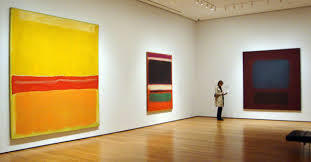Christopher Zoukis's Blog, page 26
July 28, 2014
Simon Schama's Power of Art - Rothko, part 4 of 7
To achieve the effect of light emanating from the very core of his paintings, Rothko began to stain pigments into his canvas by applying numerous thin layers of color one over the other, often allowing portions of these layers to appear through the top coat of paint. This enabled him to re-create, in a contemporary manner, the resonant light of Rembrandt, whom he very much admired. Rothko could also make color statements rivaling those of Henri Matisse, arguably the single greatest influence...
July 25, 2014
Simon Schama's Power of Art - Rothko, part 3 of 7
Rothko's work was influenced by Nietzsche, Greek mythology, and his Russian-Jewish heritage; Rothko's artemanated emotional content that he articulated through a range of styles that evolved from figurative to abstract. Rothko's early figurative work - including landscapes, still lifes, figure studies, and portraits - demonstrated an ability to blend Expressionism and Surrealism. His search for new forms of expression led to his color field paintings, which employed shimmering color to conve...
July 23, 2014
Simon Schama's Power of Art - Rothko, part 2 of 7
Mark Rothko was born Marcus Rothkowitz in Dvinsk, Russia (now Daugavpils, Latvia), on September 25, 1903, and immigrated to the United States with his family in his youth. In the mid-20th century, he belonged to a circle of New York-based artists (also including Willem de Kooning and Jackson Pollock) who became known as the Abstract Expressionists. His signature works, large-scale paintings of luminous colored rectangles, used simplified means to evoke emotional responses. Rothko committed s...
July 21, 2014
Simon Schama's Power of Art - Rothko, part 1 of 7
A documentary about the american abstract expressionist painter Mark Rothko. A BBC program.
Mark Rothko (Latvian: Markus Rotkovičs, Russian: Марк Ро́тко; born Ма́ркус Я́ковлевич Ротко́вич; Marcus Yakovlevich Rothkowitz; September 25, 1903 – February 25, 1970) was an American painter of Russian Jewish descent. He is generally identified as an Abstract Expressionist, although he himself rejected this label and even resisted classification as an "abstract painter." With Jackson Pollock and Will...
July 18, 2014
Claudius the God: Read by Derek Jacobi - Robert Graves
Read in the style of a secret diary, this famous sequel to I, Claudius gives a wry and human view of the Roman world, bringing to life some of the most scandalous and violent times in history.
July 16, 2014
The White Goddess
Sparkling green and white in the blue waters of the Mediterranean Sea, just off the coast of Spain, there is an archipelago called the Balearic Islands. The largest of these islands, the ‘major’ island, carries the appropriate name of Majorca.
On the northwest coast of Majorca sits the quiet village of Deya, serene beyond words. Like the many-breasted God of the Hebrews, El Shaddai, small hills press up toward the sky all along the coast. Deya surrounds and encompasses o...
July 14, 2014
LGBT Month Celebrated in Federal Prison: A Validation for Lives Dismissed
By Christopher Zoukis / Huffington Post
At the start of June, pink flyers announcing LGBT Month started appearing around FCI Petersburg, a medium-security federal prison in Petersburg, Virginia, where I am incarcerated. The fliers, along with many colorful postings in the Education Department, explained what LGBT means: lesbian, gay, bisexual and transgender. They profiled famous and successful LGBT persons, and generally strived to inject an element of understanding into the prison populatio...




